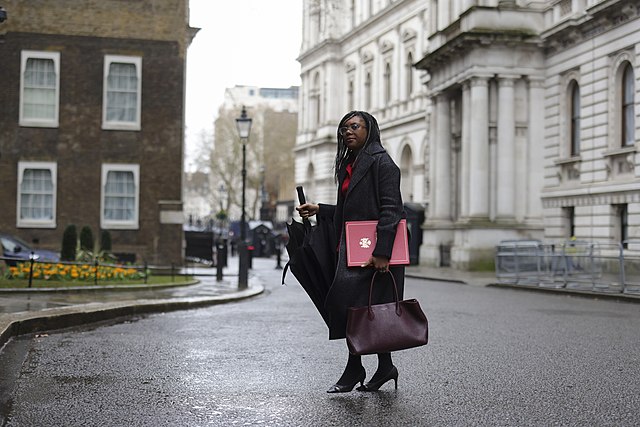
Please Follow us on Gab, Minds, Telegram, Rumble, GETTR, Truth Social, X
The spat between the leader of the UK’s opposition Conservatives, Kemi Badenoch, and Nigel Farage over the latter's claim for his party, Reform UK, that its membership has surpassed that of the Conservatives feels like a classic silly season story.
Lots of sound, lots of fury, but no real import. Badenoch’s claim that the numbers are fraudulent, and specifically stating that Farage himself was presenting ‘fake’ figures comes across as seminally stupid. One cannot libel a political party, but you can libel an individual.
Farage has asked her to apologise and her silence has been deafening. It is possible that he will sue over it. Some, almost all Conservative supporters, have suggested that this is all rather unedifying and both should move on. However the furore goes to the heart of Mrs Badenoch, and her suitability to be the leader of the opposition.
The importance of trust and character in a leader cannot be overstated. It is glaringly apparent that these qualities serve as the bedrock upon which effective leadership is built. Trust is not merely a nice-to-have; it is essential for fostering relationships between leaders and the public, as well as within the political apparatus itself. Part of what defines it is the ability to hold one’s hands up. When one has made a mistake. This is something that seems to be absent in Mrs Badenoch’s character.
In a recent interview she stated, “I never have gaffes or apologising (sic) for something that I said, ‘Oh that’s not what I meant’. I never have to clarify because I think very carefully about what I say” ~ possibly one of the least self aware and foolhardy statements I have ever heard from a politician in all my years.
A leader's character shapes their decision-making processes and influences their ability to inspire confidence among colleagues. When people trust their leaders, they are more likely to support policies and initiatives, fostering a sense of unity and purpose. Conversely, when trust erodes—often due to dishonesty or lack of transparency, or in this case denial — governance becomes an uphill battle, marked by scepticism and division.
Moreover, character plays a crucial role in the ethical framework of a leader's actions. A leader with integrity is more likely to make decisions that prioritise the common good over personal or political gain. This moral compass not only guides them through turbulent times but also sets a standard for others within their party and government. In an era where political scandals and ethical lapses seem all too common, the public yearns for leaders who embody principles of honesty and accountability.
Beyond the domestic, character and trust are vital in international relations. A leader who is perceived as trustworthy can negotiate more effectively, garnering respect and cooperation from allies and adversaries alike. In contrast, a leader seen as duplicitous or lacking in contrition risks isolation and distrust on the global stage, undermining their country’s interests.
Trust and character are not just buzzwords; they are the lifeblood of effective leadership. As we look to the future, it is imperative that we hold our leaders to these standards, demanding that they embody the integrity and reliability that a functioning democracy requires.
A leader’s character fosters a culture of accountability and transparency. Leaders with integrity are more inclined to seek out diverse perspectives, engage in thorough deliberation, and weigh the potential consequences of their actions. This commitment to thoughtful decision-making not only enhances the quality of outcomes but also builds trust with the public, who can see that their leaders are committed to ethical principles.
Moreover, character impacts the resilience of decision-making across government in times of crisis. Leaders with strong character are better equipped to navigate challenges with composure and foresight. They are more likely to consider the broader implications of their actions and to communicate effectively with the public, fostering a sense of unity and shared purpose during difficult times.
In recent weeks Kemi Badenoch has gone to war with lunch, the humble sandwich and now with Nigel Farage himself. Worse when called out to prove her allegations she has retreated into what looks like panicked silence. For it to recover from its historical drubbing at the polls the Conservative Party needs a leader that is self aware, that is resilient.
Right now it has a leader that is clearly neither of these things.
Subscribe to our evening newsletter to stay informed during these challenging times!!
Trust and character - Nigel Farage is just as fucked as Kemi B in that case
Leader is a synonym for tyranny.